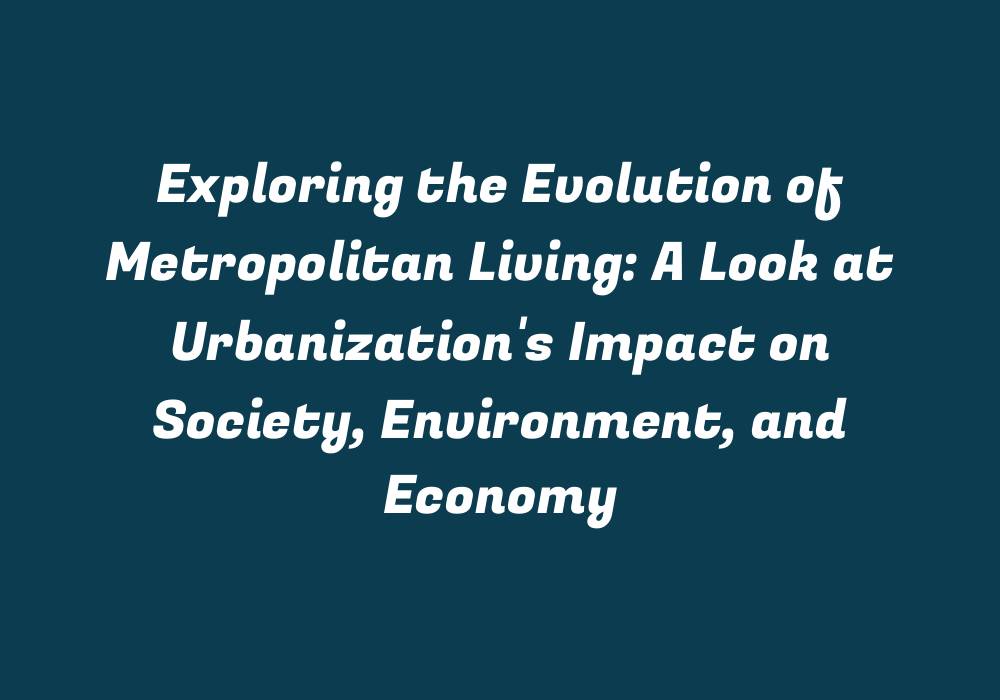Introduction: Understanding Metropolitan Living’s Evolution
Metropolitan living has undergone significant changes throughout the centuries, reflecting how societies have developed and shaped their environments. From ancient civilizations to modern times, urbanization has had a profound impact on various aspects of society, including social dynamics, economic growth, and environmental challenges. In this article, we will delve into how urbanization has influenced these critical areas over time.
Social Dynamics: A Changing Landscape
The evolution of metropolitan living has dramatically transformed social dynamics. As populations increase and cities grow, people from diverse backgrounds are brought together, leading to increased cultural exchange and interdependence. The expansion of educational opportunities and access to information have also contributed to greater social mobility.
Due to urbanization, new relationships between individuals, families, and communities evolve. Social stratification may shift as traditional hierarchies become more fluid, creating potential for greater equality in society. Moreover, the intermingling of various cultural groups can lead to the emergence of innovative ideas and fresh perspectives that ultimately contribute to the advancement of civilization.
Environmental Impact: A Balancing Act
Urbanization has had both positive and negative effects on the environment, with cities’ rapid growth often causing pollution and degradation. On one hand, urban spaces offer greater economic opportunities that can lead to increased resource consumption, energy demands, and waste generation. This can put a strain on natural resources and contribute to air, water, and noise pollution.
On the other hand, urbanization has enabled the development of innovative technologies, research initiatives, and environmental policies. The concentration of human resources in metropolitan areas fosters collaboration and knowledge sharing for tackling complex environmental challenges. As a result, these cities often have more efficient infrastructure and services that can minimize wasteful practices.
To mitigate the negative impact of urbanization on the environment, it is crucial to adopt sustainable practices and policies, promote green spaces within cities, invest in renewable energy sources, and encourage public transportation. By working towards a balance between economic growth and environmental protection, metropolitan living can become more harmonious with nature.
Economic Growth: Urbanization’s Role
Urbanization has been closely linked to economic growth throughout history. The concentration of people and resources in metropolitan areas creates a favorable environment for innovation, entrepreneurship, and the exchange of ideas. This has resulted in more efficient and specialized production systems that ultimately drive economic prosperity.
Moreover, cities offer various infrastructure advantages that facilitate commerce and trade. Transportation networks, communication systems, and advanced technologies enable rapid information dissemination and efficient market integration. These factors contribute to higher productivity and innovation, which can lead to increased economic growth.
However, urbanization has also contributed to social inequality by concentrating wealth in certain areas while leaving others behind. It is crucial to develop policies that address the economic challenges associated with metropolitan living, such as affordable housing, access to education and healthcare, and public services for disadvantaged communities.
Conclusion: Embracing Metropolitan Living’s Potential
The evolution of metropolitan living has significantly impacted society, environment, and the economy. As urbanization continues to transform our world, it is essential to recognize its potential for promoting social harmony, environmental sustainability, and economic growth. By adopting innovative approaches to address the challenges faced by metropolitan areas, we can ensure that the ongoing transformation of human settlements results in a more equitable, resilient, and prosperous society.
